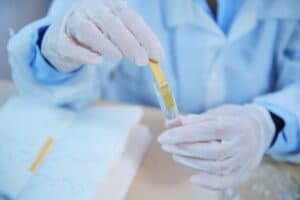What Does Water Testing Do?
Water testing is the process of analyzing a sample of water to determine its quality. It is an important aspect of drinking water safety because contaminated water can make anyone sick. Whether your water comes from a public or private well, you should test it regularly to ensure that it is safe for use.
(Looking for a counter top water filtration system? Contact us today!)

What Does Water Testing Do?
There are many different types of water testing, but most of them have one thing in common: they help to determine the health of your water supply. The tests vary in terms of cost and accuracy, but they all give you a general idea of what’s going on with your water supply.
Basic Chemical and Microbiological Testing
There is a lot that goes into making your water safe for consumption, and it all starts with the chemical content. A good water analysis lab will be able to test your water for several different chemicals and microbial organisms.
For example, the lab may analyze your water for bacteria and other organic contaminants such as nitrates or nitrogen. It will also check the pH level and conductivity. This information will help you decide if you need to invest in additional filtration or if it’s safe to drink your water straight from the tap.
These tests are useful for identifying any changes in your water’s chemistry or identifying any microbial issues that could have been caused by natural change and runoff. They are also helpful for determining if there’s any corrosion in the pipes or if your system is leaking chemicals into the water that could be harmful to your health.
A professional water testing lab will be able to tell you if there are any potential problems with your drinking water, and will also give you advice on how to prevent them in the future. There are several different types of tests available, from simple strips that can be ordered online to professional-grade meter readings that will give you a detailed report on your water’s chemistry.
If your water has been contaminated, it’s important to take action as soon as possible. You can contact your local water district or your county environmental health department for more information on the most effective ways to address your problem.
Homeowners often choose to have their own water tested for a variety of reasons, from ensuring that they have healthy water for their family to figure out how to fix the issue themselves. They’ll find that most of these tests can be done at home and that it’s cheaper to do than send the water off for professional testing.
Some of the most popular and inexpensive tests for water include the chlorine test strip or a water pH test kit. These tests are quick, inexpensive, and can detect the presence of a number of different chemical substances. However, they are not as accurate as the other types of tests and can be hard to interpret if you don’t have the proper equipment.

